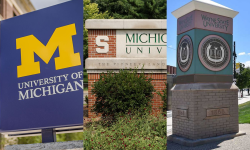Michigan Gov. Gretchen Whitmer, Benton Harbor reach tentative deal to save high school

Update: New Michigan school superintendent: Keep Benton Harbor High open
Update: Gov. Whitmer to Benton Harbor High: Raise scores, balance books or close
State officials and the Benton Harbor School Board reached a tentative agreement to keep the city’s lone, academically struggling high school open, state officials said Wednesday.
The district must see its students improve academically while also paying down $18 million in debt under broad outlines of an agreement announced following a late-afternoon meeting in Lansing between school board members and officials of the office of Gov. Gretchen Whitmer and the state treasurer’s office.
Details of the agreement weren’t released, but Tiffany Brown, spokesperson for Governor Whitmer, confirmed the agreement would keep the high school open in exchange for Benton Harbor Public Schools agreeing to academic improvement goals and making progress on its debt.
Related Benton Harbor schools coverage:
- In Benton Harbor schools, a lesson for – and about – Gretchen Whitmer
- Anguish in Benton Harbor as years of mistakes lead to likely demise of high school
- As deadline passes, Benton Harbor and state negotiate fate of high school
- Albion lost its high school; students did better. Is Benton Harbor next?
- Opinion: Please, Gov. Whitmer, fix Benton Harbor High. Don’t close it.
- Whitmer faces some backlash over Benton Harbor High closing
“The State of Michigan’s number one concern has been developing a plan that puts students first and improves outcomes for kids in the Benton Harbor District,” said a statement released by the governor’s office.
According to the governor’s office, state officials have identified national experts with experience turning around school districts who will be brought in to help.
In May, Whitmer and the treasury department released a plan to close Benton Harbor High School, with the students dispersed to 10 nearby traditional and charter high schools. Benton Harbor would be converted to a K-8 district.
If the board didn’t agree to close the high school, Whitmer said in May she would ask the Legislature to dissolve the district completely.
The district has been one of the lowest academically performing districts in the state for years. No junior in the past five years was considered “college ready” by scores on standardized tests. Six years after graduation, just 6 percent of the class of 2011-12 had earned an associate’s degree or higher – one sixth the state average.
Whitmer’s plan to shutter the high school caused an uproar in low-income, African-American majority Benton Harbor, and among many Democrats across the state, including the two African-American members of the State Board of Education.
Both sides toned down rhetoric in the past week as officials looked for a way to save the community’s high school and still provide some assurances of better academic opportunities for students.
According to Brown, of the governor office, the tentative agreement would leave the high school open for the coming school year. The school could still be closed if the district doesn’t show academic improvement.
It wasn’t immediately clear if the tentative agreement included any debt relief for the district. Currently, about $700 of every student’s per-pupil funding, currently about $8,000 per year, goes to debt payments.
An early version of a deal Benton Harbor made to the state included an offer to sell some district-owned property to help relieve some debt.
Any agreement with the state will need to be approved by a vote of the Benton Harbor school board. Benton Harbor School Board Vice President Joseph Taylor declined comment.
Casandra Ulbrich, president of the State Board of Education, said she was pleased that a tentative agreement had been reached.
“I am very encouraged by the progress that has been made on behalf of the students of Benton Harbor,” Ulbrich said. “Today, all sides came together for an open and honest dialogue about the next steps for Benton Harbor schools and demonstrated a real commitment to developing a plan that is future-focused and anchored in student success.”
State Board of Education member Tiffany Tilley said the tentative agreement is a step forward, but the state could still force the school to close down the road. "There is still the question of local control,” Tilley said. “I am concerned about any organizations ability to pivot in just 12 months, and the list of benchmarks could be a lofty goal. I do however applaud Governor Whitmer's willingness to come back to the table with creative ideas, out of the box thinking, and resources."
Michigan Education Watch
Michigan Education Watch is made possible by generous financial support from:
Subscribe to Michigan Health Watch
See what new members are saying about why they donated to Bridge Michigan:
- “In order for this information to be accurate and unbiased it must be underwritten by its readers, not by special interests.” - Larry S.
- “Not many other media sources report on the topics Bridge does.” - Susan B.
- “Your journalism is outstanding and rare these days.” - Mark S.
If you want to ensure the future of nonpartisan, nonprofit Michigan journalism, please become a member today. You, too, will be asked why you donated and maybe we'll feature your quote next time!





